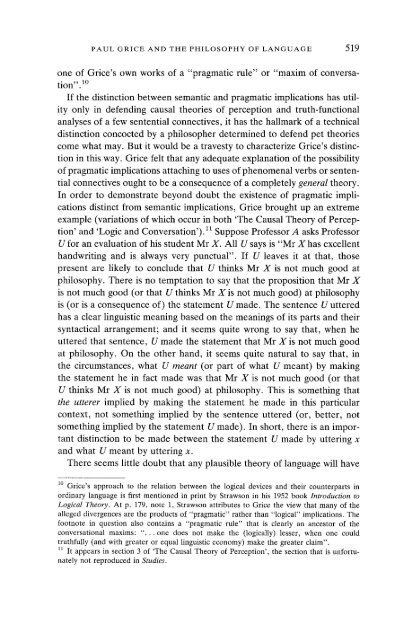Paul Grice and the philosophy of language
Paul Grice and the philosophy of language
Paul Grice and the philosophy of language
You also want an ePaper? Increase the reach of your titles
YUMPU automatically turns print PDFs into web optimized ePapers that Google loves.
PAUL GRICE AND THE PHILOSOPHY OF LANGUAGE 519<br />
one <strong>of</strong> <strong>Grice</strong>'s own works <strong>of</strong> a "pragmatic rule" or "maxim <strong>of</strong> conversation".<br />
10<br />
If <strong>the</strong> distinction between semantic <strong>and</strong> pragmatic implications has utility<br />
only in defending causal <strong>the</strong>ories <strong>of</strong> perception <strong>and</strong> truth-functional<br />
analyses <strong>of</strong> a few sentential connectives, it has <strong>the</strong> hallmark <strong>of</strong> a technical<br />
distinction concocted by a philosopher determined to defend pet <strong>the</strong>ories<br />
come what may. But it would be a travesty to characterize <strong>Grice</strong>'s distinction<br />
in this way. <strong>Grice</strong> felt that any adequate explanation <strong>of</strong> <strong>the</strong> possibility<br />
<strong>of</strong> pragmatic implications attaching to uses <strong>of</strong> phenomenal verbs or sentential<br />
connectives ought to be a consequence <strong>of</strong> a completely general <strong>the</strong>ory.<br />
In order to demonstrate beyond doubt <strong>the</strong> existence <strong>of</strong> pragmatic implications<br />
distinct from semantic implications, <strong>Grice</strong> brought up an extreme<br />
example (variations <strong>of</strong> which occur in both 'The Causal Theory <strong>of</strong> Perception'<br />
<strong>and</strong> 'Logic <strong>and</strong> Conversation').11 Suppose Pr<strong>of</strong>essor A asks Pr<strong>of</strong>essor<br />
U for an evaluation <strong>of</strong> his student Mr X. All U says is "Mr X has excellent<br />
h<strong>and</strong>writing <strong>and</strong> is always very punctual". If U leaves it at that, those<br />
present are likely to conclude that U thinks Mr X is not much good at<br />
<strong>philosophy</strong>. There is no temptation to say that <strong>the</strong> proposition that Mr X<br />
is not much good (or that U thinks Mr X is not much good) at <strong>philosophy</strong><br />
is (or is a consequence <strong>of</strong>) <strong>the</strong> statement U made. The sentence U uttered<br />
has a clear linguistic meaning based on <strong>the</strong> meanings <strong>of</strong> its parts <strong>and</strong> <strong>the</strong>ir<br />
syntactical arrangement; <strong>and</strong> it seems quite wrong to say that, when he<br />
uttered that sentence, U made <strong>the</strong> statement that Mr X is not much good<br />
at <strong>philosophy</strong>. On <strong>the</strong> o<strong>the</strong>r h<strong>and</strong>, it seems quite natural to say that, in<br />
<strong>the</strong> circumstances, what U meant (or part <strong>of</strong> what U meant) by making<br />
<strong>the</strong> statement he in fact made was that Mr X is not much good (or that<br />
U thinks Mr X is not much good) at <strong>philosophy</strong>. This is something that<br />
<strong>the</strong> utterer implied by making <strong>the</strong> statement he made in this particular<br />
context, not something implied by <strong>the</strong> sentence uttered (or, better, not<br />
something implied by <strong>the</strong> statement U made). In short, <strong>the</strong>re is an important<br />
distinction to be made between <strong>the</strong> statement U made by uttering x<br />
<strong>and</strong> what U meant by uttering x.<br />
There seems little doubt that any plausible <strong>the</strong>ory <strong>of</strong> <strong>language</strong> will have<br />
lo <strong>Grice</strong>'s approach to <strong>the</strong> relation between <strong>the</strong> logical devices <strong>and</strong> <strong>the</strong>ir counterparts in<br />
ordinary <strong>language</strong> is first mentioned in print by Strawson in his 1952 book Introduction to<br />
Logical Theory. At p. 179, note 1, Strawson attributes to <strong>Grice</strong> <strong>the</strong> view that many <strong>of</strong> <strong>the</strong><br />
alleged divergences are <strong>the</strong> products <strong>of</strong> "pragmatic" ra<strong>the</strong>r than "logical" implications. The<br />
footnote in question also contains a "pragmatic rule" that is clearly an ancestor <strong>of</strong> <strong>the</strong><br />
conversational maxims: "...one does not make <strong>the</strong> (logically) lesser, when one could<br />
truthfully (<strong>and</strong> with greater or equal linguistic economy) make <strong>the</strong> greater claim".<br />
11 It appears in section 3 <strong>of</strong> 'The Causal Theory <strong>of</strong> Perception', <strong>the</strong> section that is unfortunately<br />
not reproduced in Studies.














